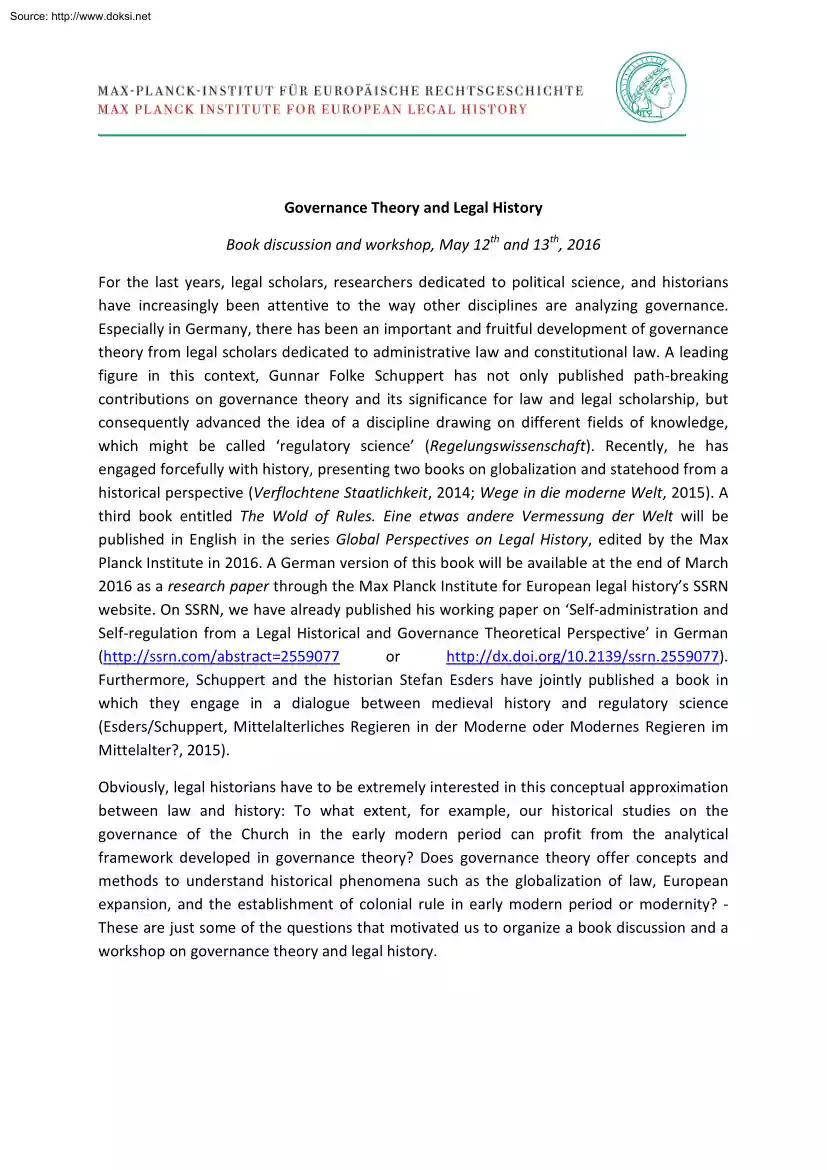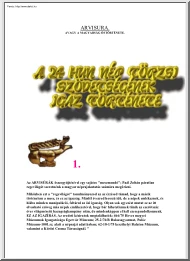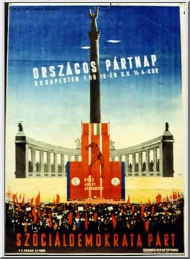Datasheet
Year, pagecount:2016, 2 page(s)
Language:English
Downloads:3
Uploaded:January 22, 2018
Size:662 KB
Institution:
-
Comments:
Max Planck Institute For European Legal History
Attachment:-
Download in PDF:Please log in!
Comments
No comments yet. You can be the first!Most popular documents in this category
Content extract
Source: http://www.doksinet Governance Theory and Legal History Book discussion and workshop, May 12th and 13th, 2016 For the last years, legal scholars, researchers dedicated to political science, and historians have increasingly been attentive to the way other disciplines are analyzing governance. Especially in Germany, there has been an important and fruitful development of governance theory from legal scholars dedicated to administrative law and constitutional law. A leading figure in this context, Gunnar Folke Schuppert has not only published path-breaking contributions on governance theory and its significance for law and legal scholarship, but consequently advanced the idea of a discipline drawing on different fields of knowledge, which might be called ‘regulatory science’ (Regelungswissenschaft). Recently, he has engaged forcefully with history, presenting two books on globalization and statehood from a historical perspective (Verflochtene Staatlichkeit, 2014; Wege in die
moderne Welt, 2015). A third book entitled The Wold of Rules. Eine etwas andere Vermessung der Welt will be published in English in the series Global Perspectives on Legal History‚ edited by the Max Planck Institute in 2016. A German version of this book will be available at the end of March 2016 as a research paper through the Max Planck Institute for European legal history’s SSRN website. On SSRN, we have already published his working paper on ‘Self-administration and Self-regulation from a Legal Historical and Governance Theoretical Perspective’ in German (http://ssrn.com/abstract=2559077 or http://dx.doiorg/102139/ssrn2559077) Furthermore, Schuppert and the historian Stefan Esders have jointly published a book in which they engage in a dialogue between medieval history and regulatory science (Esders/Schuppert, Mittelalterliches Regieren in der Moderne oder Modernes Regieren im Mittelalter?, 2015). Obviously, legal historians have to be extremely interested in this
conceptual approximation between law and history: To what extent, for example, our historical studies on the governance of the Church in the early modern period can profit from the analytical framework developed in governance theory? Does governance theory offer concepts and methods to understand historical phenomena such as the globalization of law, European expansion, and the establishment of colonial rule in early modern period or modernity? These are just some of the questions that motivated us to organize a book discussion and a workshop on governance theory and legal history. Source: http://www.doksinet There will be two activities: On Thursday, May 12th, 2016 at 3 p.m, we would like to discuss together with Gunnar Folke Schuppert his upcoming book, The World of Rules. Eine etwas andere Vermessung der Welt, in particular, its theses and the possible consequences for legal historical research. The reference point for this discussion is the German version of the book, to be
published on SSRN in March. Therefore, passive knowledge of German for the discussion is essential. On Friday, May 13th, 2016, we would like to analyze the heuristic value of the Governance perspective by looking at particular historical formations. For this, we would like to discuss – after an introductory presentation (Schuppert/Duve) – inputs from the research on Antiquity (Lundgreen), the Middle Ages (Esders) , the Early Modern Period (Albani/Härter), Chinese Legal History (Dykstra/Bin Wong) and History of 19th Century Regulation (Collin). Participants are welcome to register until April 25th, 2016 under sekduve@rg.mpgde
moderne Welt, 2015). A third book entitled The Wold of Rules. Eine etwas andere Vermessung der Welt will be published in English in the series Global Perspectives on Legal History‚ edited by the Max Planck Institute in 2016. A German version of this book will be available at the end of March 2016 as a research paper through the Max Planck Institute for European legal history’s SSRN website. On SSRN, we have already published his working paper on ‘Self-administration and Self-regulation from a Legal Historical and Governance Theoretical Perspective’ in German (http://ssrn.com/abstract=2559077 or http://dx.doiorg/102139/ssrn2559077) Furthermore, Schuppert and the historian Stefan Esders have jointly published a book in which they engage in a dialogue between medieval history and regulatory science (Esders/Schuppert, Mittelalterliches Regieren in der Moderne oder Modernes Regieren im Mittelalter?, 2015). Obviously, legal historians have to be extremely interested in this
conceptual approximation between law and history: To what extent, for example, our historical studies on the governance of the Church in the early modern period can profit from the analytical framework developed in governance theory? Does governance theory offer concepts and methods to understand historical phenomena such as the globalization of law, European expansion, and the establishment of colonial rule in early modern period or modernity? These are just some of the questions that motivated us to organize a book discussion and a workshop on governance theory and legal history. Source: http://www.doksinet There will be two activities: On Thursday, May 12th, 2016 at 3 p.m, we would like to discuss together with Gunnar Folke Schuppert his upcoming book, The World of Rules. Eine etwas andere Vermessung der Welt, in particular, its theses and the possible consequences for legal historical research. The reference point for this discussion is the German version of the book, to be
published on SSRN in March. Therefore, passive knowledge of German for the discussion is essential. On Friday, May 13th, 2016, we would like to analyze the heuristic value of the Governance perspective by looking at particular historical formations. For this, we would like to discuss – after an introductory presentation (Schuppert/Duve) – inputs from the research on Antiquity (Lundgreen), the Middle Ages (Esders) , the Early Modern Period (Albani/Härter), Chinese Legal History (Dykstra/Bin Wong) and History of 19th Century Regulation (Collin). Participants are welcome to register until April 25th, 2016 under sekduve@rg.mpgde





